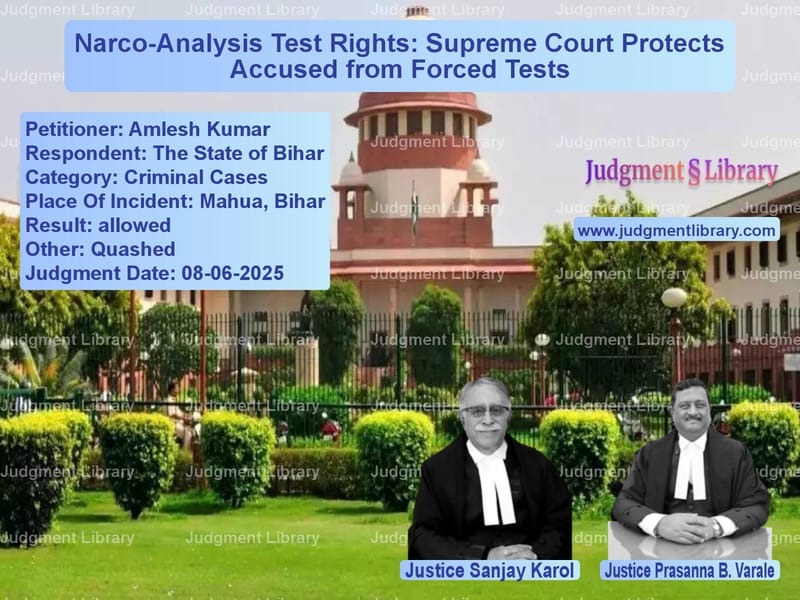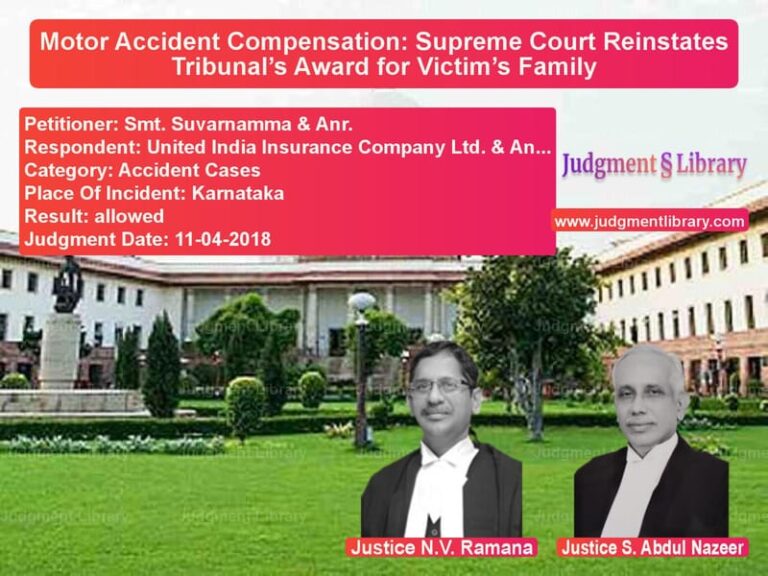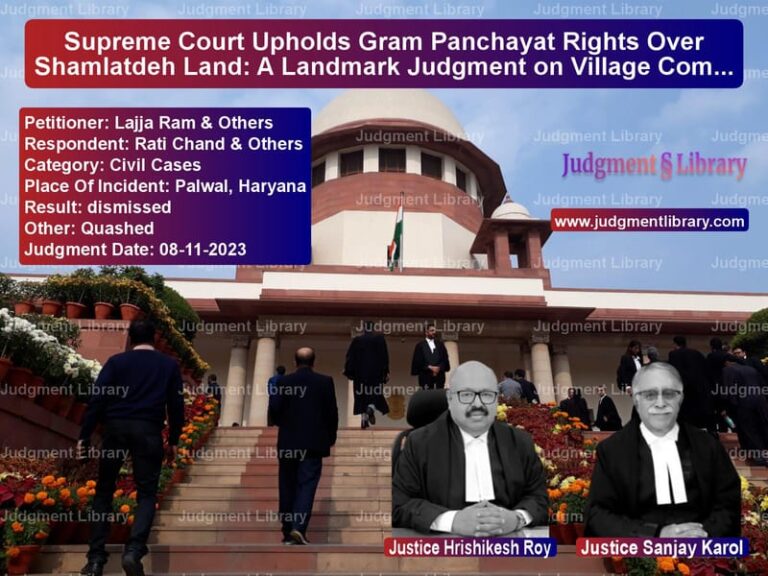Narco-Analysis Test Rights: Supreme Court Protects Accused from Forced Tests
In a landmark judgment that reinforces the fundamental rights of accused persons in criminal investigations, the Supreme Court of India recently delivered a crucial verdict clarifying the legal position on narco-analysis tests. The case involved Amlesh Kumar, who challenged a Patna High Court order that accepted a police officer’s submission to conduct narco-analysis tests on all accused persons in a missing wife case. This judgment serves as a powerful reminder that constitutional protections cannot be compromised in the name of investigative efficiency, setting important boundaries for law enforcement agencies while balancing the rights of the accused.
The Case Background
The legal battle began with FIR No.545 of 2022 registered at Mahua Police Station under various sections of the Indian Penal Code, including dowry demands, cruelty, and kidnapping. The complainant alleged that her sister, married to Amlesh Kumar in December 2020, had been subjected to repeated dowry demands and physical abuse. The case took a serious turn when on August 22, 2022, the appellant informed his sister-in-law that his wife had run away from their matrimonial home. Despite extensive searches, the missing woman has not been found to date.
Amlesh Kumar presented a different version of events, claiming that while en route to Ayodhya on August 21, 2022, his wife got off the bus at Baabali Chawk for nature’s call but never returned. He filed a formal complaint about her disappearance at Jahangir Ganj police station on August 28, 2022. The case became more complicated when co-accused persons allegedly gave confessional statements claiming they had thrown the missing woman in the river Saryu.
When Amlesh Kumar’s bail application was rejected by the Sessions Court, he approached the Patna High Court. During the bail hearing, the Sub-Divisional Police Officer made a significant submission that would become the center of legal controversy. The officer assured the court that “she will get narco test of all the accused persons and other witnesses, if required in the investigation.” The High Court accepted this submission without objection, prompting Amlesh Kumar to approach the Supreme Court.
The Legal Challenge
The appellant’s primary challenge was that the High Court’s acceptance of the police officer’s submission directly contradicted the Supreme Court’s landmark judgment in Selvi and Ors. v. State of Karnataka (2010). In that case, a three-judge bench had clearly established that forceful administration of narco-analysis tests violates personal liberty under Article 21 of the Constitution and the protection against self-incrimination under Article 20(3).
The Supreme Court appointed Senior Advocate Mr. Gaurav Agrawal as Amicus Curiae to assist the court in addressing three crucial questions: whether the High Court could have accepted such a submission; whether a voluntary narco-analysis test report can form the sole basis of conviction; and whether an accused can voluntarily seek such a test as an indefeasible right.
Understanding Narco-Analysis Tests
Before delving into the legal analysis, it’s important to understand what a narco-analysis test entails. As explained in the judgment, a narco-analysis test is an interrogation method where a crime suspect is injected with a psychoactive drug, specifically sodium pentothal, under controlled conditions. This drug suppresses the subject’s reasoning power and their ability to determine what is good or bad for themselves. The same drug is used in higher dosages for inducing general anesthesia during surgeries.
The fundamental concern with such tests is that they raise serious questions about constitutional protections, particularly the right against self-incrimination under Article 20(3) and the right to personal liberty under Article 21.
The Supreme Court’s Analysis
The Supreme Court began its analysis by reiterating the principles established in the Selvi case. The Court emphasized that “Articles 20 and 21 of the Constitution are non-derogable and sacrosanct rights to which the judiciary cannot carve out exceptions.” The Court further noted that “involuntary administration of narco-analysis and similar tests is in contravention of the protection given by Article 20(3) of the Constitution, i.e. the right against self-incrimination.”
The judgment made it clear that “the results of such involuntary tests cannot be considered as ‘material evidence’ in the eyes of the law” and that “conducting such tests in the absence of consent violates ‘substantive due process’ – which is an essential element required for restraining one’s personal liberty.”
Addressing the specific facts of the case, the Court expressed its inability to find any justification for the High Court accepting the investigating officer’s submission about conducting narco-analysis tests. The Court stated: “Such a submission and its acceptance, is in direct contravention to the judgment of this Court in Selvi (supra), being hit by the protections under Articles 20(3) and 21 of the Constitution.”
The Court also questioned the procedural propriety of such a submission during bail proceedings, noting that “while entertaining an application for grant of bail, the Court has to take into consideration the allegations against the accused; period of custody undergone; nature of evidence and the crime in question; likelihood of influencing witnesses and other such relevant grounds. It does not involve entering into a roving enquiry or accepting the use of involuntary investigative techniques.”
Voluntary Tests and Their Limitations
While the Court firmly rejected involuntary testing, it also addressed the issue of voluntary narco-analysis tests. The judgment clarified that even when a person voluntarily undergoes such tests, the results cannot be directly admitted as evidence. The Court explained that “any fact or information that is discovered subsequent thereto, with the help of the information supplied in the result, can be admitted into evidence with the aid of Section 27 of the Indian Evidence Act 1872.”
However, the Court made it clear that such information cannot form the sole basis for conviction. Quoting from its earlier decision in Vinobhai v. State of Kerala, the Court reiterated: “Although disclosure statements hold significance as a contributing factor in unriddling a case, in our opinion, they are not so strong a piece of evidence sufficient on its own and without anything more to bring home the charges beyond reasonable doubt.”
This establishes an important evidentiary principle – while information discovered through voluntary tests might assist investigations, it cannot replace traditional evidence in securing convictions.
Resolving the Divergence in High Court Views
The Supreme Court noted a significant divergence in how different High Courts have approached the question of whether an accused can claim the right to undergo narco-analysis tests. Several High Courts, including Allahabad, Bombay, Delhi, Kerala, Gujarat, and Punjab & Haryana, have taken the view that involuntary tests cannot be relied upon and have examined the circumstances when accused persons seek such tests voluntarily.
However, the Rajasthan High Court in Sunil Bhatt v. State had taken a different approach, holding that accused persons can seek narco-analysis tests as part of their statutory right to lead evidence in defense under Section 233 of the Criminal Procedure Code.
The Supreme Court firmly rejected the Rajasthan High Court’s view, stating that “it cannot be said that undergoing a narco-analysis test is part of the indefeasible right to lead evidence, given its suspect nature, and moreover, we find the same to be in the teeth of the judgment of this Court in Selvi (supra).”
The Court extensively quoted from the Selvi judgment, which had cautioned that “the act of threatening to administer the impugned tests could also elicit testimony” and that “an individual may give his/her consent to undergo the said tests on account of threats, false promises or deception by the investigators.”
Guidelines for Voluntary Tests
While rejecting any indefeasible right to undergo narco-analysis tests, the Supreme Court acknowledged that accused persons do have the right to voluntarily undergo such tests at an appropriate stage, particularly when exercising their right to lead evidence during trial. However, the Court emphasized that this is not an absolute right and must be subject to judicial scrutiny.
The Court reiterated the safeguards established in the Selvi case, which must be strictly followed for any voluntary tests. These comprehensive guidelines include: the requirement of genuine consent; access to legal counsel; explanation of physical, emotional and legal implications; recording of consent before a Judicial Magistrate; representation by a lawyer during the hearing; clear communication about the evidentiary status of statements; consideration of detention factors; independent agency conducting the test; and detailed medical and factual documentation.
These safeguards ensure that even when tests are conducted voluntarily, the process respects the constitutional rights and dignity of the individual while maintaining procedural integrity.
The Final Judgment
After comprehensive analysis, the Supreme Court allowed the appeal and set aside the Patna High Court’s order. The Court directed that the appellant’s bail application, if still pending, should be decided in accordance with law, without reference to the improper submission about narco-analysis testing.
The judgment serves as a powerful reinforcement of constitutional principles in criminal jurisprudence. It establishes that modern investigative techniques, while valuable, cannot override fundamental rights. The Court explicitly stated: “While the need for modern investigative techniques may be true, such investigative techniques cannot be conducted at the cost of constitutional guarantees under Articles 20(3) and 21.”
This judgment significantly strengthens the protection against self-incrimination and reinforces the principle that personal liberty cannot be compromised for investigative convenience. It provides clear guidance to investigating agencies and courts about the limited circumstances under which narco-analysis tests may be conducted and the stringent safeguards that must accompany any such procedure.
The Supreme Court’s firm stance ensures that the constitutional balance between investigative needs and individual rights is maintained, preventing any erosion of fundamental protections that form the bedrock of India’s criminal justice system. The message is clear: truth must be discovered, but not at the cost of constitutional values and human dignity.
Petitioner Name: Amlesh Kumar.Respondent Name: The State of Bihar.Judgment By: Justice Sanjay Karol, Justice Prasanna B. Varale.Place Of Incident: Mahua, Bihar.Judgment Date: 08-06-2025.Result: allowed.
Don’t miss out on the full details! Download the complete judgment in PDF format below and gain valuable insights instantly!
Download Judgment: amlesh-kumar-vs-the-state-of-bihar-supreme-court-of-india-judgment-dated-08-06-2025.pdf
Directly Download Judgment: Directly download this Judgment
See all petitions in Bail and Anticipatory Bail
See all petitions in Legal Malpractice
See all petitions in Fundamental Rights
See all petitions in Constitution Interpretation
See all petitions in Judgment by Sanjay Karol
See all petitions in Judgment by Prasanna Bhalachandra Varale
See all petitions in allowed
See all petitions in Quashed
See all petitions in supreme court of India judgments June 2025
See all petitions in 2025 judgments
See all posts in Criminal Cases Category
See all allowed petitions in Criminal Cases Category
See all Dismissed petitions in Criminal Cases Category
See all partially allowed petitions in Criminal Cases Category







